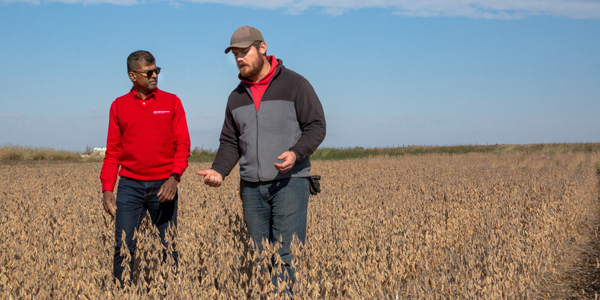
Strategies That Help: Mental Health First Aid
Farmers often are the kind of people who like to handle their own problems — hardworking, determined and self-reliant. Asking for help can be difficult.
That’s according to David N. Brown, behavioral health state specialist with Iowa State University Extension and Outreach. He says the economic problems farmers face today may be more than they can handle on their own.
“They may try to tough it out; however, toughing it out just may not work anymore,” Brown says. “They may need more help than they realize.”
According to Brown, suicide numbers in rural areas remain high, and there is mounting evidence farmers are feeling the emotional and mental burdens of a difficult farm economy.
TAKING ACTION
In order to combat the issue, Brown is working with staff and faculty across Iowa State University Extension and Outreach to provide mental health resources to farmers and the communities where they live. Mental health resources were provided at every farm bill meeting held across the state this fall — more than 50 in total. Numerous resources are available year-round via local and state extension specialists.
- In “Stress on the Farm: Strategies that Help,” participants review the signs of stress, how to cope and help others to cope.
- A similar program, called “Stress on the Farm: Strategies to Help Each Other,” offers a 40-minute scenario-based suicide prevention training.
- The “Mental Health First Aid” is an internationally recognized program that offers eight hours of training designed to give members of the public key skills to help others who are developing a mental health problem, or experiencing a crisis.
- The “Question. Persuade. Refer.” program is a one-hour educational initiative designed to teach lay and professional gatekeepers about the warning signs of a suicide crisis, and the appropriate response.
ONGOING EFFORT
In partnership with extension staff across the state, Brown is connecting with farmers and their organizations. Mental health issues can arise even in good economic times, but usually more so when times get tough, says Chad Hart, associate professor in economics and extension grain markets specialist.
Hart has partnered with Brown in adding mental health programming to extension programs, including the farm bill meetings, and also at industry conferences including the Iowa Farmers Union statewide convention held in December. Although it’s a sensitive topic, Hart says farmers seem to appreciate the discussion, as long as they’re approached responsibly and in a way that avoids singling them out.
“Being involved with farming means that you’re used to doing a lot on your own,” says Hart. “But sometimes, even the best of us need help from others.”
PROVIDING EMPATHY, RELIEF
Reviews by farmer participants show the programs they’ve attended have been valuable. Some have commented on how they can now, “understand other people’s possible problems,” and that extension and outreach “needs to be commended,” for raising awareness about the issue.
“With the current economic environment in agriculture, along with the weather this past year, this is something that could be laying below the surface, that may surface before long,” one participant wrote in a program evaluation.
As mental health gains recognition across the nation, more resources and programs are being made available. In October, the United States Department of Agriculture awarded $480,000 to Iowa State University’s Extension and Outreach’s mental health efforts, as part of the Farm and Ranch Stress Assistance Network program, authorized in the 2018 farm bill.
Looking ahead, 2020 will be a big year for mental health awareness and outreach.
“I feel that we’re really ramping up our programming, among our own staff and also with our outreach,” Brown says. “I see us gearing up and working with the agribusiness and producer community, by providing a lot of relief and useful information.”



